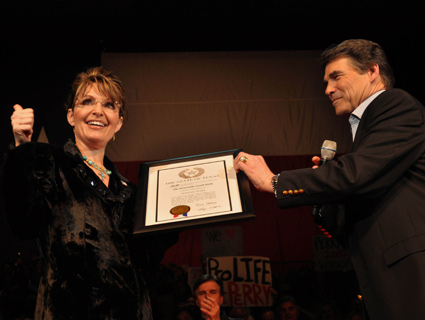On the campaign trail and on the web, Rick Perry touts a supposedly sterling record on transparency. But the facts don’t back him up. Last week, his office settled an ethics complaint accusing his campaign of hiding the fact that it spent hundreds of thousands of dollars worth of campaign contributions spent on party supplies for the governor’s mansion. That wasn’t an isolated incident, Politico reports:
Though other states have email retention policies sometimes calling for deletion after 30 or 45 days, Texas’s seven-day period is possibly the briefest…The policy, a holdover from former President George W. Bush’s gubernatorial administration in Texas, calls on staffers to print out emails that might be covered by the Texas Public Information Act, but there’s no check on their judgment.
Perry also has refused to release a range of existing records that have been made public by both his predecessors in Texas and by governors of other states, including his daily schedule, his office’s reviews of death penalty cases—even lists of guests who stayed overnight at the governor’s mansion.
Bush not only released lists of overnight guests at the governor’s mansion during his governorship, including big donors, but during his 2000 presidential campaign, he released 3,125 pages of records detailing almost his entire schedule. It included everything from meetings with lobbyists and donors, to time spent reviewing death penalty cases, to his workout breaks.
Perry has also sought to keep secret his cozy ties with big donors, as well as details of past budget negotiations. This summer, the state legislature gave him an assist by passing a bill that will delay the release of information on his security detail’s travel records until after the 2012 election.
So does Perry think he has an openness problem? “I think we give so much information already that it is boring,” he said last October. Information-overload isn’t the issue. Perry doesn’t seem to get the basic point that destroying any traceable record of his public life suggests that he has something to hide.










